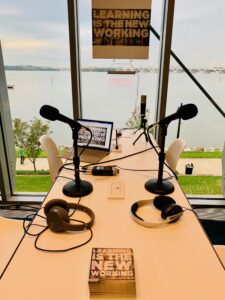
Recently, I sat down with Matt Donovan, Vice President of global learning and performance improvement organization GP Strategies Corporation for a November episode of my podcast, Learning Is The New Working. Think of it as a view from 30,000 feet on the on-going digital transformation of Learning, including handling rising Learner expectations of better digital experiences, based on their exposure to great consumer tech.
In our conversation, Matt also gave me a very thoughtful ‘state of the union’ on what’s happening in the weird and wonderful world of instructional design.. which, as he jokes with me, he’s well placed to give, as he describes himself as “a recovering instructional designer”!
What Matt told me: there is an essential core of ID that remains perfectly valuable and fit for purpose in the modern L&D world. But just as interestingly, he shares a frame of reference for the modern Workplace Learning technology stack, and importantly where tech should ideally fit in the overall schema of design considerations:
It’s a journey, not a transaction Don’t focus on courses, but on where you need learners to get to and build awesome Learning journeys for them
- Think About The 5 Moments of Need This a great tool for starting to pick up when Learners are most primed. In parallel, think of practical ways of connecting people across the ecosystem of performers to get help from experts at the right moment.
- The Value Of Measurement Put the work in to identify the critical business metrics you want to impact and work back from the business data, as, remember, you get back what you measure
- L&D Needs To Move At The Speed Of Business Today Optimize our process to remain relevant!
- Agile/Waterfall Methodology is critical but it’s an ‘and’ not a n’or’ conversation. His (very useful) rule of thumb: if you don’t know what good looks like, be agile and iterate; if you know, use Waterfall.
- Adopt a Discrete to Integral Manufacturing Mindset Aka, a human enablement system holistically integrated into industrial processes
Ultimately, Matt believes that the core principles of ID hold up well, but that there is hard work that practitioners still have to do have to do around being evidence based, Learner and business centered, and fully open to our stakeholders into the system – after all, as he says in our conversation, ‘We are not Instructional Psychics!’
